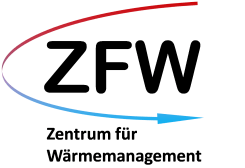In addition to product-specific advice, we also offer training courses on all aspects of thermal management as part of the ZFW Academy. Therefore, we regularly organize in-house training courses and seminars for companies to train in the field of cooling and heat management. In addition to our own in-house training courses, we also frequently give lectures at various training institutions.
Further training modules at university level for practical use
We offer further training in the areas
- Thermal management in electronics
- Basics and selected topics of mechatronics
The concept:
- Due to our close connection to the Baden-Wuerttemberg Cooperative State University, Faculty of Technology, the modules are based on the lecture content of the university.
- The modules can be booked individually. Or we can put together a complete package for your company that is tailored to your requirements.
- Our lecturers have teaching experience at universities and also have a lot of practical experience.
- The events take place mainly online. We use complex transmission technology with several cameras for online transmission.
Language: German (spring 2025) and English (autumn 2025)
These modules will be offered in 2025 in GERMAN on the following dates:
Module 1: Physical principles
March 31st, 2024, 8:15 a.m. - 4:15 p.m., online in German
Physical basics: heat transport through heat conduction, convection and heat radiation. Thermal contact resistance, heat spread. Simple basic equations for rough calculations. Illustrating the theory with practical examples.
Module 14: Getting started with thermal simulation
April 1st, 2025, 8:15 - 11:30 a.m., online in German
This module imparts both general knowledge and specialised knowledge of how to use the Siemens ‘Simcenter FloEFD’ simulation software.
The possibilities and limitations of the simulation are demonstrated using simple examples that everyone can understand. After completing the module, participants will be able to carry out simple simulations themselves and assess the extent to which simulations can be used in the respective development process. Previous knowledge is not necessary. If no basic knowledge of thermodynamics is available, attendance of Module 01 ‘Fundamentals of Thermodynamics’ is recommended.
The following points are discussed:
- Why is simulation used?
- Which systems can be simulated?
- Simulation process (e.g. control unit with PCBAs)
- Networking
- Permissible simplifications of simulations
- Use of target optimisation software to reduce temperature, pressure loss and weight
Participants will then be able to carry out simple simulations independently.
Module 12: Temperature measurement technology
April 1st, 2025, 1:00 p.m. - 4:15 p.m., online in German
Thermocouples, resistance thermometers and thermal imaging cameras.
Correct attachment of temperature sensors, errors due to heat dissipation, dynamic behavior, typical measurement errors with thermal imaging cameras, influence of the emissivity, measurement errors due to interference radiation. Live demonstrations (also online).
Module 6: Thermal interface materials 1
April 2nd, 2025, 8:15 a.m. - 11:30 a.m., online in German
Thermally conductive pastes, thermally conductive adhesives, gels, PCM, PADs and foils, selection criteria,
Aging behavior and failure mechanisms, operating temperature and reliability.
Module 7: Thermal interface materials 2 - test methods
April 2nd, 2025, 1:00 p.m. - 4:15 p.m., online in German
Power cycling, temperature change test, vibration test, electrical test, thermal analysis in the event of shear (battery swelling application), standards and experience
from practice
Module 8: Thermally conductive filled polymers: from theory to practice
April, 3rd, 2025, 8:15 - 11:30 a.m., online in German
Thermally conductive filled polymers are widely used in electronic systems. As thermal interface materials, potting compounds and dielectric layers in insulated metal substrates, they contribute significantly to the dissipation of heat losses.
The development of highly conductive polymer composites that are also easy to process is a complex and time-consuming process. The achievable properties such as thermal conductivity, viscosity and density depend largely on the fillers used and their interaction. The microscopic material and packing structure is particularly important.
During the seminar, the influences of
- Filler material and particle shape,
- Particle size and size distribution,
- maximum packing density and
- agglomeration
will be developed and explained step by step. This is followed by a theoretical consideration of packing effects and filler-filler interactions as well as ideal filler combinations.
The occurrence of thermal contact resistance between filled polymers and neighbouring solids is also discussed.
Building on the theoretical content discussed, practical formulation developments and optimisation strategies will be discussed. Participants will learn how to adjust the thermal and rheological properties. In addition to simple correlations, modern calculation tools are also used for this purpose.
Module 15: The basics of rheology: from liquid to solid
April 3rd, 2025, 1:00 p.m. - 4:15 p.m., online in German
Methods for thermal analysis of heat paths in electronic systems: Measurement of temperature and thermal conductivity using the laser flash method, the stationary cylinder method according to ASTM D5470, the hot wire method (and modifications thereof). Analysis with the thermal transient method. Difference in thermal conductivity/effective thermal conductivity. Comparison of the methods and comparability of the measurement results, possibilities and limitations, common errors in practical application.
Module 9: Thermal Analysis Methods
April 4th, 2025, 8:15 a.m. - 11:30 a.m., online in German
Methods for thermal analysis of heat paths in electronic systems: Measurement of temperature and thermal conductivity using the laser flash method, the stationary cylinder method according to ASTM D5470, the hot wire method (and modifications thereof). Analysis with the thermal transient method. Difference in thermal conductivity/effective thermal conductivity. Comparison of the methods and comparability of the measurement results, possibilities and limitations, common errors in practical application.



